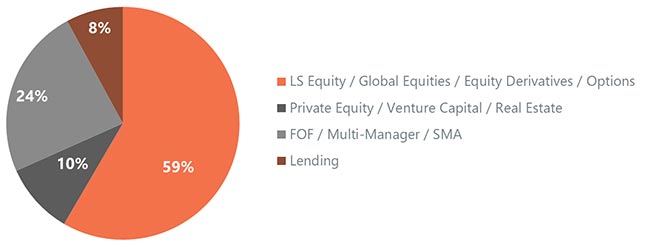The Fund Administrator’s Perspective: Real Estate Funds Poised for Robust Growth
- Published
- May 7, 2018
- Share
Real estate funds are on track for robust growth and continued demand and will require operational changes to satisfy investor requests and industry best practices.
In the first quarter, of the new client engagements that Opus received, 10% were dedicated to real estate, private equity and venture capital. This includes new launches and existing managers who were bringing on a fund administrator for the first time. See chart below.

In general, the increase in closed-end launches was most noticeable and significant in the first quarter compared to previous quarters.
A closed-end fund typically invests in assets that are not freely transferable nor traded on an established market or exchange and are not marked to market, as in an open-end fund. The illiquid nature of the portfolio holdings dictates the fund structure. An additional influence on structure is the time and process needed for managers to raise capital, identify investment opportunities and deploy capital. In many cases, these funds will have a limited life cycle (e.g., seven years) that is correlated to the portfolio holdings and investment thesis. Managers will raise money during an initial closing period and will then draw-down on investor commitments via a capital call process to fund investments as needed.
Investor appetite for private equity, private debt, venture capital and real estate investments remains strong, as returns amongst these managers have been and continue to be attractive. Recent volatility in the equities markets, rate hikes, and the possibility for inflation growth may also be contributing to investor demand for high quality fund managers that are raising capital for a specific deal, private loans (e.g., small business, factoring), or an investment into physical assets or real estate.
Real estate funds, for example, are launching to invest in areas such as residential (e.g., flips, rentals), commercial (e.g., office, retail), industrial, land and lending (e.g., bridge loans, hard money loans). Beyond the potential realized returns at the end of the fund life cycle when holdings are liquidated, investors in real estate funds may also receive income via preferred returns or distributions which are tied to the fund’s operating activity, such as rental or interest income. Distributions can be paid out monthly, quarterly or at varying frequencies depending on the underlying activity of the fund.
From an entity formation perspective, we are seeing many real estate funds launch in a Series LLC structure. This allows for each underlying investment to sit within its own separate LLC entity, which has benefits from liability, operational, and accounting perspectives. This structure works particularly well for funds buying physical properties, such as buildings or housing. The performance of each LLC rolls up into the fund NAV, where investors sit. Some structures also allow for investors to customize their allocations and pick which LLC they want exposure to.
While real estate funds have often handled many of these operational and accounting tasks internally, we are seeing more funds adapt to investor requests and industry best practices by hiring a third-party fund administrator. There is also an increase in the number of existing funds converting away from self-administration. We predict this trend will continue to gain significant momentum over the next 12-24 months.
I recently spoke with an investor who has traditionally invested in hedge funds, where using a third-party fund administrator is standard practice. This investor receives independent investor statements from the fund administrators of those hedge funds. However, in his due diligence process with several real estate funds, he discovered that this was not always the standard practice. Receiving performance and investor reporting directly from the managers carries obvious risk and operational due diligence concerns. The administrator will independently calculate NAVs, process investor transactions and reporting, perform AML/KYC, process capital calls and distributions, prepare annual financial statements and support the audit/tax process. For a modest monthly fee, an administrator is typically a fund expense that investors are happy to assume.
In our view, the real estate and greater closed-end fund community will continue to grow and evolve quickly under current market conditions. This growth will also positively impact how funds operate, interact with investors and leverage their service providers.
Asset Management Intelligence – Q2 2018
- A Refresher on Broker-Dealer Expense Sharing Agreements
- The Fund Administrator’s Perspective: Real Estate Funds Poised for Robust Growth
- Technical Corrections Provisions Impact Partnership Audit Rules
- Alternative Investment Industry Outlook for Q2 and Beyond
- GDPR: How Asset Managers Can Comply by May Deadline
- Considerations for Establishing an Investment Fund in the Cayman Islands
Contact EisnerAmper
If you have any questions, we'd like to hear from you.
Receive the latest business insights, analysis, and perspectives from EisnerAmper professionals.










